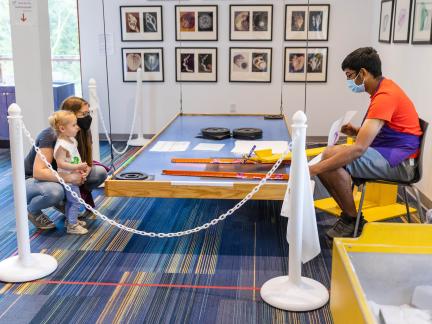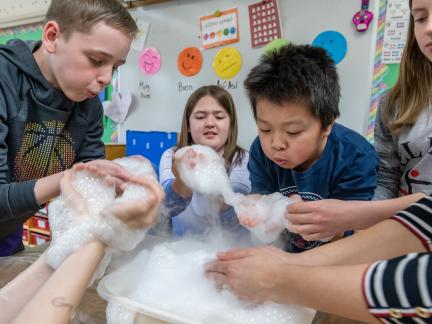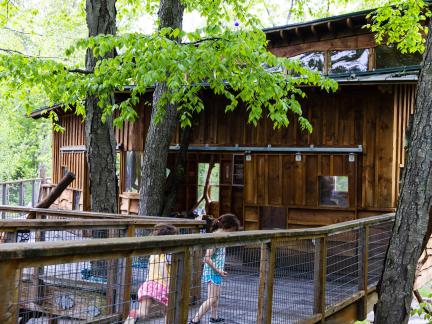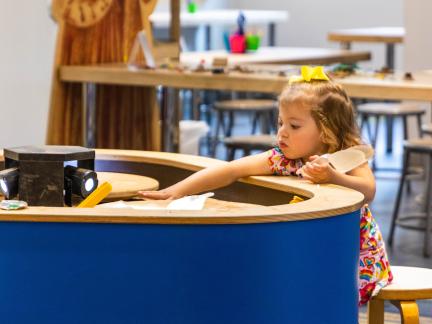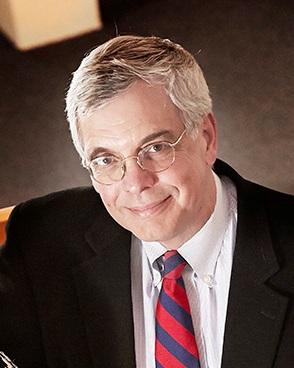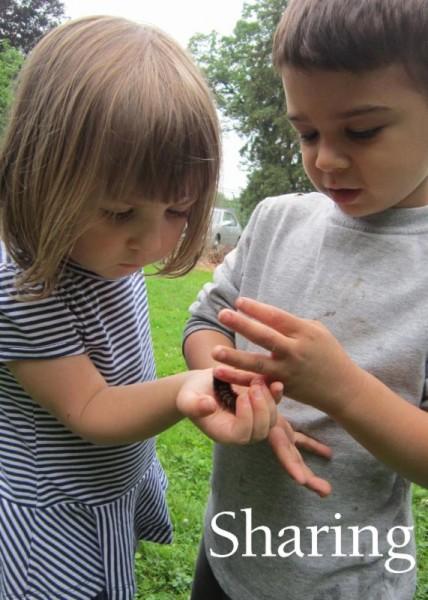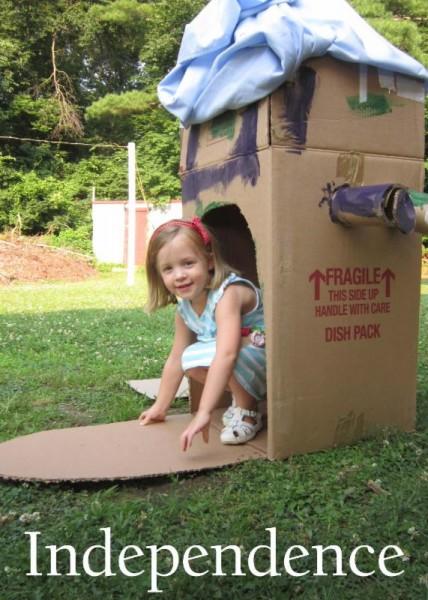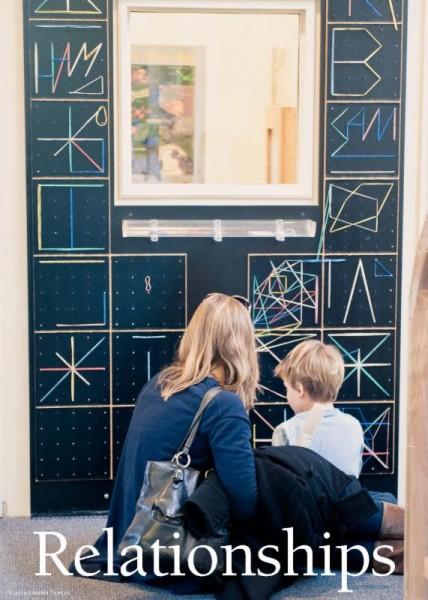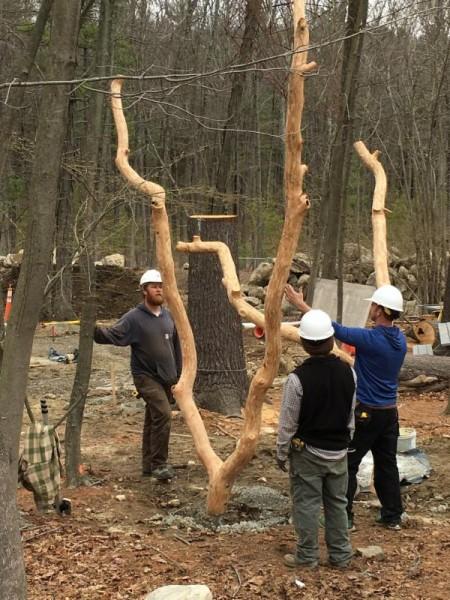Update from our CEO, April 2016
Dear Friend of the Museums,
Loving relationships give young children a sense of comfort, safety, confidence, and encouragement.
So, what is the big news with that? The big news is that the leading thinkers in education policy have determined, through significant research, that healthy social-emotional development in children is not just "nice," but is critical to long-term positive outcomes and yields impressive returns on investment.
Here in Massachusetts, the Rennie Center for Education Research & Policy, perhaps our preeminent voice in public education reform, has recently chosen to highlight social-emotional learning in its annual Condition of Education in the Commonwealth report. The Rennie Center points to the development of social-emotional skills formed in early childhood as the foundation not only for school success, but for lifelong achievement.
Readiness to learn: When young children learn how to self-regulate, engage productively in learning activities, and interact positively with others, they have the foundation they need to function in school and continue developing the social-emotional competencies they will need throughout their lives. Further, positive social-emotional skills foster a sense of enjoyment and motivation related to learning. Studies have found that preschool gains in competencies like social problem-solving and conflict resolution predict school engagement and reading achievement through kindergarten and into first grade. Meanwhile, young children who do not develop appropriate social-emotional competencies participate measurably less in the classroom and are less likely to feel accepted by teachers and peers.[i]
Similarly, the education think tank Transforming Education builds the research-based case for "non-cognitive" (social-emotional) skills. Their recent working paper, Ready to Be Counted: The Research Case for Education Policy Action on Non-Cognitive Skills lists nine important conclusions from the data on social-emotional skill development. In terms of academics, career success, and personal well-being, the authors point to significantly improved levels of success correlated with higher non-cognitive skills. The paper notes that their findings are consistent with what 93% of teachers already believe to be true.[ii]
And, here is what the ZERO TO THREE initiative of the National Center for Infants, Toddlers, and Families has to say in their paper, Social-Emotional Development: Birth to 12 Months:
Starting from birth, babies are learning who they are by how they are treated. Loving relationships give young children a sense of comfort, safety, confidence and encouragement. They teach young children how to form friendships, communicate emotions, and to deal with challenges. Strong, positive relationships also help children develop trust, empathy, compassion, and a sense of right and wrong. [iii]
The paper identifies valuable and simple ways in which parents, grandparents, and care givers can build the strong, positive relationships that are so important to young children. And it notes that young children learn best when we let them play, explore, and follow their interests, while we provide feedback, just enough support, comfort, and security.
What does and can The Discovery Museums do to support these simple suggestions, and support parents and caregivers in their key role in supporting children's social and emotional skill development right from birth? Many things:
• Model for parents the approach and atmosphere conducive to supporting healthy learning in young children.
• Provide safe environments with lots to explore at your own pace, with occasional encouragement and feedback.
• Demonstrate the value of simple, approachable, familiar materials.
• Foster the taking of time to allow exploration to happen.
When we undertake the planned expansion of our facilities, we will create an even more welcoming environment to support the very earliest learners and their families. Brain Building Zone, for children aged zero through three and their caregivers, will be a major new exhibit that focuses on simple ways for parents to support the early brain development of their children. I'm happy to report that these efforts recently received a significant boost.
The Campaign for The Discovery Museums is an $8.4M effort to expand, renovate, and provide even more for our community. Thanks to support from many, we started 2016 "just" $2M from our goal. In mid-March we received word that The Manton Foundation had issued a $1M Community Challenge: they will match dollar-for-dollar all campaign gifts for the next twelve months up to $1M. Successful completion of that Community Challenge will keep us on a track to tackle our major physical renovation and expansion in 2017. Check out the recent press article on this terrific news.
We are thrilled that so many supporting factors are pointing in the same direction as we are: education thinkers are highlighting the value of our work; funders are seeing our plans as an important investment in children and families; and our community is supporting us day in and day out.
We look forward to reaching more people to tell our story. Here are some upcoming events when you—and a friend—can join us:
Breakfast with the CEO
An opportunity for community members new and old to enjoy some time at our museum, hear about our work and new projects, and ask questions. Free, but registration is required.
Two upcoming dates:
Tuesday, May 3, 9:00-10:30am;
Tuesday, June 7, 9:00-10:30am;
Science Discovery Museum, 177 Main Street, Acton
The Discovery Museums Speaker Series
Nancy Carlsson-Paige, Ed. D. will speak on "Taking Back Childhood: Helping Children Thrive in Challenging Times." Includes an informal reception with hors d'oeuvres, beer, wine, and soft drinks. Free, but registration is required.
Wednesday, May 25, 6:30 to 8:30pm;
UU Wellesley, 309 Washington Street, Wellesley Hills
Meanwhile, work continues apace on development of Discovery Woods and building of the treehouse! Teams have been reclaiming wood for the treehouse foundation posts and trim pieces. The form of the slide hill is in place and a full-scale mockup of the slide will be built soon. The foundation boards for the walkway are in place, and we're expecting a group of volunteers later this month to build decking. It's all very exciting!
I would love to hear from you about what we are doing and how you can help. Please email me at ngordon [at] discoverymuseums.org with any thoughts you'd like to share.
All the best,
Neil H. Gordon
Chief Executive Officer
________________________________________
[i] Rennie Center for Education and Research Policy. (2016). Condition of Education in the Commonwealth: Toward a More Comprehensive Vision of Student Learning. Boston, MA.
[ii] Transforming Education. (2015). Ready To Be Counted: The Research Case for Education Policy Action on Non-Cognitive Skills. Boston, MA.
[iii] ZERO TO THREE, National Center for Infants, Toddlers, and Families. (2010). Social-Emotional Development: Birth to 12 Months. Washington, DC.
